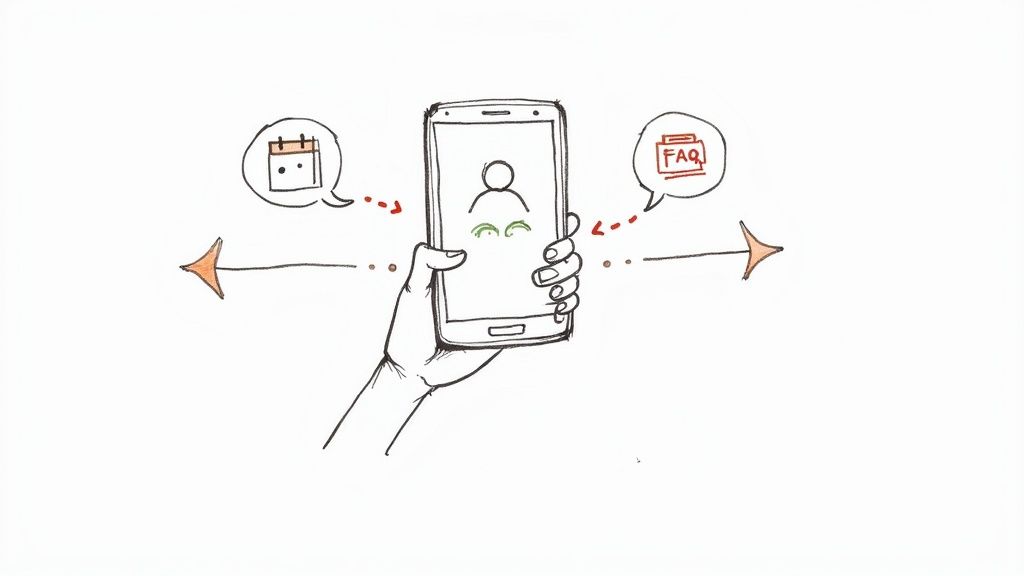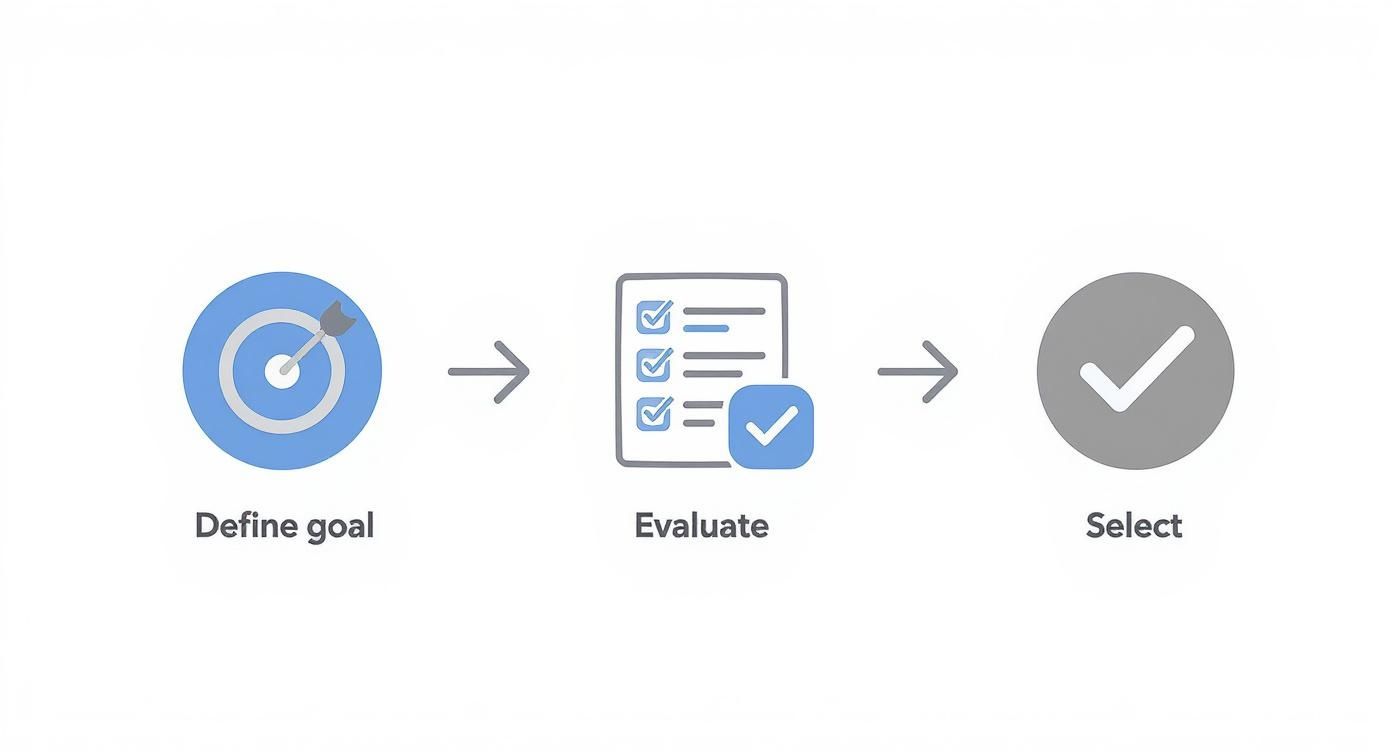A virtual assistant answering calls is basically an automated, AI-powered system that handles your business's incoming phone calls, 24/7. This isn't just a fancy voicemail. It’s a tool that makes sure you never miss a customer inquiry, a hot lead, or a booking request—capturing every single opportunity that would otherwise vanish into thin air.
Stop Missing Calls and Losing Customers

We’ve all been there. You're right in the middle of a crucial task—on a job site, deep in a client meeting, or just trying to focus on a complex project. Then, the phone rings. You’ve got a split second to decide: drop what you’re doing to answer, or let it go to voicemail and probably lose that customer forever.
For most small business owners, this isn't just a hypothetical. It's the daily grind. Every single missed call is a lost opportunity. In fact, a staggering 85% of callers who don't get an answer will not call back. They just move on to the next name on their list. This constant leak of potential business can quietly sink your growth before you even realize what's happening.
The Modern Solution to an Age-Old Problem
The old-school fix was to hire a full-time receptionist or sign up for a pricey answering service. But a much smarter, more efficient alternative is here now. A virtual assistant for calls acts as your digital front desk, ensuring every single person who calls gets an immediate, professional response, whether it’s noon or midnight. This isn't some far-off concept; it’s a practical tool you can start using today.
And it’s so much more than a glorified answering machine. A truly intelligent virtual assistant can:
- Provide Instant Answers: Handle all the common questions about your hours, location, or services without batting an eye.
- Schedule Appointments: Sync directly with your calendar to book meetings or service calls on the spot.
- Qualify Leads: Ask the right questions to gather key information from new callers and figure out exactly what they need.
- Route Urgent Calls: Intelligently identify high-priority calls and transfer them to the right person on your team.
By automating the front line of your communications, you create a bulletproof system where no lead ever falls through the cracks. Your phone line transforms from a constant source of interruption into a reliable engine for business growth.
Ultimately, this guide will show you why using a virtual assistant for your calls is a strategic move. It's about creating a flawless first impression that builds trust from the very first ring and sets your business apart. For a deeper dive, check out our guide to building a small business phone answering strategy.
How AI Is Changing Business Phone Calls

So, what exactly is a modern virtual call assistant? First, forget everything you know about those clunky, robotic answering machines from the past. Think of this technology more like a hyper-efficient digital receptionist that actively engages with callers to solve their problems on the spot.
Where an old-school machine just passively records a message for you to deal with later, a virtual assistant answering calls uses smart technology to understand what a caller needs and then acts on it. It’s a huge leap from passive message-taking to active problem-solving, and it’s on the clock 24/7.
From Answering Machine to Intelligent Assistant
The magic behind this shift is a technology called Natural Language Processing (NLP). In simple terms, NLP is what gives the AI the ability to understand human speech—not just the words, but the intent behind them. It can tell the difference between "I need to book an appointment" and "I need to check my appointment."
This opens the door for the system to handle a whole range of tasks instantly:
- Answering Common Questions: It can rattle off your hours, address, or service details without missing a beat.
- Intelligent Call Routing: If a caller has a tricky or urgent issue, the AI knows exactly which human expert to send them to, no frustrating transfers needed.
- Direct Calendar Integration: It can schedule appointments or book service calls straight into your calendar, cutting out all that back-and-forth emailing.
This same principle of smart automation is making waves across all sorts of industries. You see a similar impact in AI's role in revolutionizing booking systems, where the goal is to make complex scheduling feel effortless. It’s that same power that makes a virtual assistant so effective on your phone line.
The Exploding Market for AI Call Handling
This isn't just a niche trend; the numbers show a massive industry-wide shift. The market for AI receptionists alone hit $3.85 billion this year and is on track to smash $9 billion by 2033. That’s a 134% surge, which tells you just how much businesses are starting to rely on AI to handle their customer conversations.
This growth is all being driven by a simple reality: a modern AI phone answering system delivers a smooth, professional experience for every single person who calls. It makes your business look responsive and on top of its game, even when you're busy on a job or it's long after closing time.
By handling the routine, repetitive calls that clog up 60-80% of inbound phone traffic, the AI frees up your team to focus on the high-value conversations that actually bring in revenue.
It’s all about creating an efficient frontline for your business that never calls in sick. This technology works around the clock to make sure every call enhances your reputation and captures potential business, turning your phone from a source of stress into one of your most powerful assets.
The Strategic Perks of Answering Calls Automatically
Bringing a virtual assistant on board to handle your calls is so much more than a simple convenience—it’s a powerful strategic move that hits your bottom line, hard. Instead of just thinking of it as another piece of software, you should see it as a core investment in three critical areas: your financial health, your customers' happiness, and your team's sanity.
The first and most obvious win is a massive drop in operational costs. Hiring a full-time, in-house receptionist comes with a hefty price tag. You’re not just paying a salary; you're on the hook for benefits, training, and all the overhead that comes with another employee. Even old-school answering services get pricey, often billing by the minute for calls that could have been handled in seconds by an AI.
A virtual assistant answering calls, on the other hand, works for a tiny fraction of that cost. It takes the firehose of routine calls off your plate—questions about business hours, services, or appointment booking—which cuts down the need for a human to be constantly glued to the phone. This simple shift frees up your budget for things that actually grow the business, not just things that keep the lights on.
Let's break down how the costs and benefits stack up.
Human Receptionist vs Virtual Assistant Answering Calls
Here’s a side-by-side look at what you’re really getting when you choose between a traditional hire and an AI-powered assistant.
| Feature | Human Receptionist | Virtual Assistant |
|---|---|---|
| Availability | Typically 8 hours/day, 5 days/week. | 24/7/365, including holidays and weekends. |
| Cost | Full-time salary, benefits, training, and overhead. | Low monthly subscription fee. |
| Call Capacity | Handles one call at a time. | Manages hundreds of simultaneous calls. |
| Consistency | Performance can vary with mood, training, or workload. | Delivers the same perfect, branded response every time. |
| Efficiency | Can get tied up with long calls, putting others on hold. | Instantly resolves routine queries in seconds. |
| Scalability | Scaling requires hiring and training more people. | Scales instantly with call volume at no extra cost. |
While a human touch is invaluable for complex issues, the table makes it clear: for the day-to-day grind of call handling, an AI assistant is just a smarter, more efficient engine for your business.
Taking the Customer Experience to the Next Level
Beyond the dollars and cents, an AI assistant fundamentally changes the experience you offer every single person who calls you. We live in an on-demand world; customers want answers now. Forcing them to wait on hold or leave a voicemail you might not hear for hours is a fantastic way to lose them to a competitor.
An AI assistant guarantees every call gets picked up on the first ring, 24/7/365. That round-the-clock presence means you’re always open for business, ready to help a customer the moment they decide they need you. That kind of instant response builds trust right away and sets a professional, reliable tone from the very first hello.
The consistency you get from an AI assistant is a total game-changer. Every caller gets the same accurate information, the same polite greeting, and the same efficient service. That creates a predictable and dependable customer journey that keeps people coming back.
Giving Your Team Their Focus Back
Finally, one of the most powerful, yet often overlooked, benefits is the massive productivity boost your team gets. Constant phone interruptions are a focus-killer. They pull your skilled people away from the high-value work that actually makes you money. In fact, research shows it can take over 20 minutes to get back into a state of deep focus after just one small interruption.
When you let a virtual assistant handle the frontline calls, you give your team permission to concentrate on what they do best. Think about what that means in practice:
- Your sales team can spend their time actually closing deals with qualified leads instead of screening calls.
- Your technicians can finish their jobs without constantly stopping to answer the phone.
- Your support specialists can dedicate their brainpower to solving the complex problems that genuinely need a human touch.
This smart division of labor makes sure your human talent is used where it matters most. To dig deeper into how this works, check out our detailed guide on the benefits of an automated telephone answering service. At the end of the day, a virtual assistant isn't just answering calls—it's creating the time and space your business needs to thrive.
Real-World Applications Across Industries

It's one thing to talk about this technology in theory, but where does the rubber really meet the road? A virtual assistant answering calls isn't some generic tool; it's more like a Swiss Army knife that adapts to the unique pulse of different industries, solving the specific, everyday problems that cost businesses time and money.
Think about a busy medical clinic. The front desk is a constant flurry of activity. An AI assistant can step in to handle appointment scheduling, fire off automated reminders to patients, and even process prescription refill requests. This single change can slash no-show rates and, more importantly, free up staff to focus on the patients standing right in front of them.
Or consider the fast-paced world of real estate, where every single call could be the next big commission. An AI assistant can work around the clock to qualify new leads, asking those critical first questions about budget, location, and property type. This ensures that human agents spend their valuable time talking to serious, pre-vetted buyers, not just kicking tires.
Powering Service and Retail Operations
For local service pros like plumbers or HVAC technicians, a ringing phone often means a customer in distress. But these folks are usually out on a job, unable to answer. A virtual assistant can manage emergency dispatch by gathering the crucial details—the caller's location, the nature of the problem—and instantly forwarding that info to the right technician.
The assistant can also schedule routine jobs and give callers real-time updates on their tech’s arrival time, creating an experience that feels seamless and professional.
And in the e-commerce world, customer happiness often comes down to getting quick, accurate information. A virtual assistant can instantly field the most common questions that clog up support lines:
- Order Status: "Where is my package?"
- Return Policies: "How do I start a return?"
- Product Information: "Does this come in blue?"
By handling these repetitive queries, the AI lets human support agents tackle the more complex customer issues that really require a personal touch, which in turn boosts satisfaction and loyalty.
A Rapidly Growing Market
This isn't just a niche trend; it's a full-blown market shift. The global demand for virtual answering solutions is surging as businesses of all sizes realize they need to be more responsive. The market, currently valued at $2.5 billion, is expected to more than double to $5.1 billion by 2033. This growth is all about the need to offer 24/7 support while keeping operational costs in check. You can dig into more insights on this expanding market in the full market forecast.
The versatility of a virtual call assistant is its greatest strength. It can be finely tuned to act as a lead qualifier for a law firm, a booking agent for a hotel, or a frontline support specialist for an online store.
When you get down to it, these real-world examples show that this technology isn't about replacing people. It's about empowering them. By automating the predictable, repetitive communication tasks, a virtual assistant frees up human talent to focus on what truly matters—building relationships, solving complex problems, and driving growth.
How to Choose the Right Virtual Call Assistant
Picking the right virtual assistant for your calls isn't about chasing the fanciest tech. It's about finding the right fit for your business. The platform that's perfect for a medical clinic is going to be a terrible match for an HVAC contractor, and that’s just how it is.
So, where do you start? Before you even look at a single feature list, you have to get crystal clear on what you need this thing to actually do. Is your number one priority capturing every single lead that comes in? Or is it scheduling appointments seamlessly? Maybe you just need a smart, reliable frontline for basic customer support. Define that goal first.
Once you know your "why," you can start looking at providers through that lens. It's easy to get distracted by a laundry list of features you'll probably never touch. Stay focused on the core functions that will solve your biggest headaches and actually make you money.
Key Features to Evaluate
To make a smart decision, you need a checklist. Measure every potential virtual assistant answering calls against these non-negotiables. These are the things that separate a genuinely helpful tool from a frustrating bottleneck.
-
Integration Capabilities: Your virtual assistant can't be an island. It absolutely has to play nice with the tools you already rely on, whether that's your CRM, your calendar software (like Google Calendar or Outlook), or a specific job management platform. This is the secret sauce that enables true automation—logging new leads or booking appointments without a human ever touching it.
-
Customization and Control: A generic, one-size-fits-all script is a recipe for disaster. You need a platform that lets you build custom call flows and scripts that sound like you. It has to reflect your brand's voice and your unique way of doing things. You need total control over how the AI greets callers, the questions it asks, and how it routes different inquiries, from a hot sales lead to an urgent service call.
The whole point is to create an experience that feels like a natural extension of your team, not some generic, robotic answering machine. Your callers should feel heard and helped, not just processed.
Scalability and Analytics
Your business isn't going to stand still—it's going to grow, and your call volume will grow right along with it. Your virtual assistant has to be able to handle that growth without breaking a sweat. A solid provider can manage hundreds of simultaneous calls, so you never miss an opportunity, even when things get crazy busy.
Finally, don't overlook analytics and reporting. A good system does more than just give you a list of calls. It hands you valuable insights into caller behavior, common questions, and when your phone rings the most. This data is gold. It helps you understand your customers on a deeper level and fine-tune your entire operation.
For a detailed breakdown of what to look for, check out our guide on finding the best AI answering service to see how different options compare.
Measuring the ROI of Your Virtual Assistant
Bringing a virtual assistant answering calls into your business isn’t just an operational tweak; it’s a strategic investment. And like any good investment, the real question is: what’s the financial impact? Once you look past the cool features, you can find the true value by calculating its return on investment (ROI) with just a few key metrics.
First, let's talk about the leads that used to slip through the cracks. Every single unanswered call is a lost opportunity, a potential customer who probably just called your competitor. By making sure every call gets answered instantly, you can start putting a number on the new business you’re capturing.
Next up are the direct labor costs you save. Think about it. Instead of paying a full-time salary with benefits or shelling out per-minute fees for a traditional answering service, a virtual assistant handles the flood of routine calls for a tiny fraction of the cost. Big companies using voice agents in their call centers have seen cost reductions of up to 30%. It’s a huge reason the cloud-based contact center market is booming, as detailed over on Sprinklr.com.
Calculating Your Tangible Returns
To make this real, let’s walk through a simple scenario. Imagine your business misses 10 calls a day, and your average customer is worth $300. If your new AI assistant helps you capture just three of those missed opportunities daily, that’s an extra $900 in revenue hitting your books. Every. Single. Day.
This flow chart breaks down the simple steps to picking an assistant that actually works for your business goals.

When you know exactly what you want to achieve from the start, you can easily find a solution that delivers a return you can actually measure.
The ROI of a virtual assistant becomes crystal clear when you stop seeing it as a monthly expense and start treating it as a revenue-generating engine that quickly pays for itself and fuels real growth.
This investment compounds over time, too. Better customer service leads to happier, more loyal customers, which adds to your long-term revenue. A virtual assistant isn't just about cutting costs—it's a tool that actively pushes your bottom line forward. If you want to run your own numbers, you can learn more about how to calculate cost savings from an AI assistant in our in-depth guide.
Still Have Questions?
Jumping into AI for your call handling is a big step, and it's natural to have a few practical questions. Let's tackle some of the most common ones that business owners bring up when they're thinking about a virtual assistant answering calls.
Will a Virtual Assistant Sound Like a Robot to My Customers?
Not at all. This isn't the clunky, robotic voice you might be imagining. Modern AI assistants use incredibly advanced voice synthesis and Natural Language Processing to sound remarkably human and conversational.
For the everyday stuff—taking messages, booking appointments, or answering common questions—the whole exchange feels smooth and professional. Honestly, it's a massive step up from getting dumped into voicemail.
How Much of a Headache Is It to Set Up a Virtual Call Assistant?
Most of the top services out there are built for a simple, no-code setup. You can usually get the ball rolling in just a few hours. It’s a matter of mapping out your call flows, writing up scripts for the usual questions, and linking it to the tools you already use, like your CRM or calendar.
Many providers even give you templates and have support teams on standby to make the process a breeze for any business owner.
The best systems are designed for simplicity. You can go from signing up to having a fully functional AI assistant in less time than it takes to train a new employee.
Can a Virtual Assistant Handle Really Complex Questions?
This is where you have to be smart about it. Virtual assistants are absolute champs at handling routine, predictable calls. That’s their superpower. This frees up your human team to focus on the trickier, more nuanced issues where they’re really needed.
The best way to set it up is to program the AI to recognize when a call is getting complex or sensitive. From there, it can seamlessly hand the call over to a live agent. This way, your customer always gets the right person for the job without any frustration.
Ready to see how an AI assistant can completely change your business communications? With Marlie Ai, you can stop missing calls, cut your costs by up to 80%, and finally give your team the breathing room to focus on what matters most: growth.

